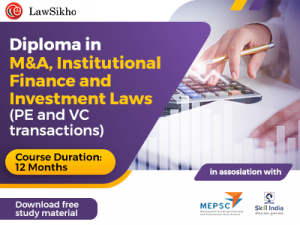This article has been written by Aman Gupta, pursuing a Diploma in M&A, Institutional Finance, and Investment Laws (PE and VC transactions) from LawSikho.
Table of Contents
Introduction
A set of guiding principles to determine “Place of Effective Management” (POEM) was issued by the CBDT vide Circular No. 06 of 2017 dated 24.01.2017, which is the latest authority on the concept of POEM, has defined “Place of effective management” as a place where key management and commercial decisions that are necessary for the conduct of the business of an entity as a whole are, in substance made. It refers that even if a Board of Directors’ Meeting is being taken place outside India but the key decision is being taken by a Senior Management physically or virtually in India, then the POEM shall be in India. POEM is a recognized test for the determination of residence of a company incorporated in a foreign jurisdiction. Section 6(3) of the Income Tax Act, 1961 (“Act”) was amended vide Finance Act, 2016 in order to introduce the concept of POEM. In Radha Rani Holdings vs. ACIT, the Delhi Tribunal confirmed that most of the shell companies incorporated outside India were actually controlled from India. Therefore, such an amendment was pertinent to bring this practice under the ambit of taxation by the Government of India.
A “Flip” transaction is such where a company incorporates another company outside their taxable territory and in a favorable jurisdiction, which subsequently is converted into the holding company of the former. The respective former company, in turn, becomes the wholly-owned subsidiary after a 100% share swap transaction where the holding company acquires a 100% paid-up capital in its international subsidiary i.e. in the former company. This flipping structure of businesses is common among emerging Indian companies or startups, which incorporate their holding company in a jurisdiction such as the US, UK, or Singapore, which is considered suitable with respect to legal compliances and corporate environment. Some of the most important aspects of flipping the corporate structure are venture capital funding and tax consideration.
This article seeks to critically analyze the applicability of the POEM test on flipping transactions and whether it would affect the trend of flipping the corporate structure outside India. 
Applicability of POEM Test on the flipped Companies
The Circular on the guiding principles for the determination of POEM of a company specifies the test that if a startup or a company is an Active Business Outside India (ABOI) then the POEM shall be presumed to be outside India. In order to tax the global income of the flipped companies in India, the flipped structure shall be reviewed with regard to POEM regulations. For a company to be an ABOI, it has to be compliant with four conditions:
- the passive income of the company shall not be more than 50% of its total income;
- less than 50% of the company’s total asset shall be situated in India;
- less than 50% of the employees shall be situated in India or are residents of India;
- less than 50% of the payroll expenditure shall be incurred on such employees.
In a situation where the corporate structure of a company is flipped to another favorable jurisdiction and the company has an ABOI outside India, the POEM shall be outside India subject to the condition if the majority meetings of the board of directors of the company are held outside India. In case, where all or most of the operations are being run by the holding company abroad, it is beneficial for the company since its residence would be determined as the foreign jurisdiction, thus, saving it from the tax liability in India. However, the tables turn when the flipped companies are other than those that are engaged in ABOI.
The circular specifies two-stage processes for companies other than those that are engaged in ABOI in order to determine the POEM for the flipped companies:
- to identify the person(s) behind the key management and commercial decisions of the company
- to determine the place where these decisions are in fact made
It is very necessary to consider this situation with respect to the tax consideration. In this scenario where the company is not compliant with the four above-mentioned conditions to be an ABOI, the POEM might be in India, a red flag for these flipped companies. If more than 50% of the parameters such as the passive income of the company, assets, employees, payroll expenditure are prevailing then there are certain aspects to be looked upon to determine the POEM, which is as follows:
- If the promoters or main founders of the flipped companies are Indian residents as defined under Section 6 of the Act, then it can be presumed that the key managerial decisions are taken inside India, unless taken otherwise, therefore the POEM shall be in India.
- If the flipped companies establish their head office in India, in such a case, it has to make sure that the senior management and support staff of the company is based in the jurisdiction where the flipped company has been incorporated, otherwise, the POEM shall be deemed to be in India. Senior Management may possibly include Managing Director and Chief Executive Officer (CEO), Financial Director or Chief Financial Officer (CFO), Chief Operating Officer (COO), and the heads of different departments.
- If the flipped companies are conducting their Board of Meetings virtually, then it is necessary that the senior management and majority of the members shall not reside in India, otherwise, the POEM shall be determined to be in India.
- If the companies after flipping are not carrying their main and substantial activity in the incorporated jurisdiction or they are placing their accounting records in India, it can be a red indication and a secondary factor for determining the tax liability of the flipped companies in India.
In M/S Shaan Marine Services Pvt. Ltd. v. DIT, the contention was that Cyprus Company was interposed to take benefit of India-Cyprus DTAA. However, the company was registered and a resident of Cyprus and was involved in the business of transporting cargo from India to the UAE. Since, substantial activities of conducting business and documents such as tax residency certificates, bills of lading, annual reports, etc. indicated its presence in the region of Cyprus, therefore, the place of effective management was held to be situated in Cyprus.
POEM is a residence-based concept therefore it is decided on a year-to-year basis. The phrase “at any time” for the determination of POEM was substituted from Section 6(3) of the Act by Finance Act, 2016. Even the Finance Minister while debating this provision in the Lok Sabha specifically mentioned that the phrase has been deleted to remove the ambiguity and therefore the entire year shall be the basis for determining the POEM in order to establish the tax liability of the flipped company, which therefore stood in the favor of these flipped companies.
The flipping effect and road ahead
The Memoranda to the Finance Bill 2015 specifically targeted the objective to deal with the practice of the shell companies to save their Indian tax liability on their global income, if the same is not taxed in any other country. By flipping, such companies automatically come under the bulwark of this objective.
The process of determining POEM for these flipped companies is based on various criteria as per the Circular, which would ultimately give birth to numerous tax disputes, which can be a demerit for them. Prior to the 2016 amendment, Section 6(3) of the Act used the term “control and management of its affairs is wholly situated in India” in place of “place of effective management” as per the current law. The use of the former term led to the practice of incorporating a company outside India and by simply holding few board meetings outside without any further check, they could negate the former requirement and thus these flipped companies escaped tax liabilities in India. However, the concept of POEM tackled this issue by monitoring the key management and commercial decisions of the companies.
Further, the Reserve Bank of India (“RBI”) has increased a layer of compliance in case of flip structure transactions outside India. Through its FAQ (as updated on September 19, 2019), all the flip structure transactions in which a subsidiary is being set up overseas, shall be subject to the approval of the RBI. This added layer of compliance again increases the chance of companies that aim to flip to bring them under the scanner of one of the apex authorities of India.
Flipping of companies to Singapore, Mauritius, and specifically Delaware (due to its inherent jurisdictional advantages), led the Indian companies’ to successfully evade tax. However, the post-2016 amendment, stricter laws, and additional compliances have made it difficult for the flipped companies to continue with this practice. Although there are existing benefits such as a conducive environment for attracting investments, stable regulations, etc that urge companies to flip with the concept of POEM coming into effect, it is paramount for the offshore holding company to keep track of its operations in order to prevent tax liability. Such complexities can discourage Indian startups to pursue flipping to a certain extent, which could ultimately affect the trend of flipping the corporate structure outside India.
References
- https://m.rbi.org.in/Scripts/FAQView.aspx?Id=32#_Toc453240610.
- https://www.indiabudget.gov.in/budget2015-2016/ub2015-16/memo/mem1.pdf.
- https://www.incometaxindia.gov.in/pages/international-taxation/dtaa.aspx.
- https://www2.deloitte.com/content/dam/Deloitte/in/Documents/tax/in-tax-place-of-effective-management-noexp.pdf.
- https://www.cbic.gov.in/resources/htdocs-cbec/fin-act2016.pdf.
Students of Lawsikho courses regularly produce writing assignments and work on practical exercises as a part of their coursework and develop themselves in real-life practical skills.
LawSikho has created a telegram group for exchanging legal knowledge, referrals, and various opportunities. You can click on this link and join:
 Serato DJ Crack 2025Serato DJ PRO Crack
Serato DJ Crack 2025Serato DJ PRO Crack










 Allow notifications
Allow notifications


